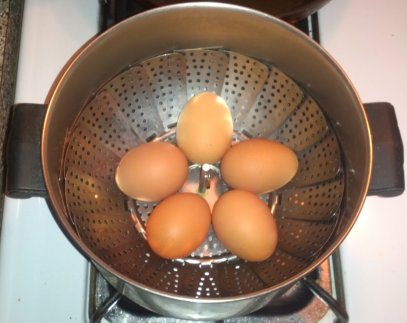Hacker Foods: Hard Boiled Eggs
###Introduction
I have a rich history with eating on the cheap. I’ve done the ramen thing, and I’ve explored lots of ways to get proper nutrition without having to scarf down my money supplies. I have little patience for spending large sums of money on simple day-to-day sustenance.
If you’re going to avoid eating away all your money without dying of malnutrition (or a heart attack), you have to face the reality that you’re going to have to prepare your own food. I like cooking, but I don’t always want to do it, and I don’t always want to spend a lot of time doing it. This has led me to look for ways to optimize what I do in the kitchen for day-to-day eating. I still sometimes cook up special meals that take more time, and I still eat out if the occasion calls for it.
###Hacker Foods: Part 1 of ?
That brings me to eggs. Eggs are packed with nutrition, and can serve as whole meals, or as quick snacks. A dozen should run you somewhere between $0.99 and $6.00. 3 eggs should feed an adult, so even at 6 bucks per dozen, we’re talking about $1.50 per meal. That’s still quite good, particularly considering the nutrition involved (I’d like to note here that I’m not advocating eating eggs exclusively).
I recommend making the world a better place and going for cage-free, or cage-free organic eggs. If you insist on getting the cheapest eggs possible, I’ll say this - I understand where you’re coming from, but I encourage you to re-examine your finances and be sure you’re picking your battles wisely.
I enjoy making omelets and scrambled eggs, but I often like to have food prepared in advance so that I can get right to hacking, or have a quick meal on-the-go. Hard boiled eggs struck me as a great food to have on-hand, but I needed a good method for making them. I asked food nerd friends for their methods, I looked to shows like “America’s Test Kitchen” and “Good Eats”, and of coursed I searched around on the net.
After a number of tests, I came up with a method I like. I present to you the easiest and most fool-proof method of cooking hard boiled eggs that I could come up with (I suppose I should call them “hard-cooked eggs”, considering the method).

-
Place a steamer basket into a pot. Any pot will do as long as the steamer basket fits inside of it. Any steamer basket will do as long as it has legs.
-
Fill the pot with hot water until the water is just below the basket. Sloshing the water, or tilting the pot will help determine when the water level is high enough.
-
Boil the water. This is one of the areas where this method shines. It doesn’t matter how long it takes for the water to boil, and you don’t have to watch it or time it. You can go do something else, and check on it occasionally. Many other methods have the eggs already in the water while you’re bringing it to a boil, which tethers you to the stovetop, lest you overcook your eggs. Furthermore, the reduced amount of water necessary for steaming means you’ll achieve a boil quicker.
-
Place the eggs in the steamer basket. There will be steam involved, so you should use tongs, or at least a couple of spoons, to place the eggs in the basket. If we had placed the steamer basket in the pot at this point instead of when heating, the water would cool off slightly and stop boiling. That could throw off the timing involved.
-
Cover the pot, and let the eggs steam. You can reduce the heat a bit at this point, as long as it maintains the boil. Set a timer for 10 minutes for fluffy yolks (go to 11 minutes if this isn’t cooked enough for you). I like to go with 9 minutes, as I prefer slightly more gelatinous yolks. Cooking with steam also means significantly fewer broken egg shells during the cooking process when compared to regular boiling.
-
When time is up, kill the heat and either fill the pot up with cold water, or transfer the eggs to cold water. I usually just fill with cold water, dump it out, and refill a few times (with a few seconds of hand stirring in between). If you don’t do this, you may end up with overcooked yolks with that green/brown color around them.
-
Eat now, or store them in the fridge and eat them within 5 days (I use an egg carton to store them). If you don’t like them cold, they warm up in the microwave very quickly. 15-30 seconds on high should be plenty to get them to room temperature or hotter.
Update: Microwaves vary in power. Be conservative if you aren’t sure if your particular microwave will blow up your particular eggs. Definitely try out 10 or 15 seconds first, and consider microwaving in intervals if you need more than that.
In addition to all the benefits already described above, steamed eggs are significantly easier to peel than the boiled kind, in my experience. Once you break open the membrane under the shell, it should all come off without much fuss.
The final step is to enjoy spending all the time and money you’ve saved. Happy hacking!
